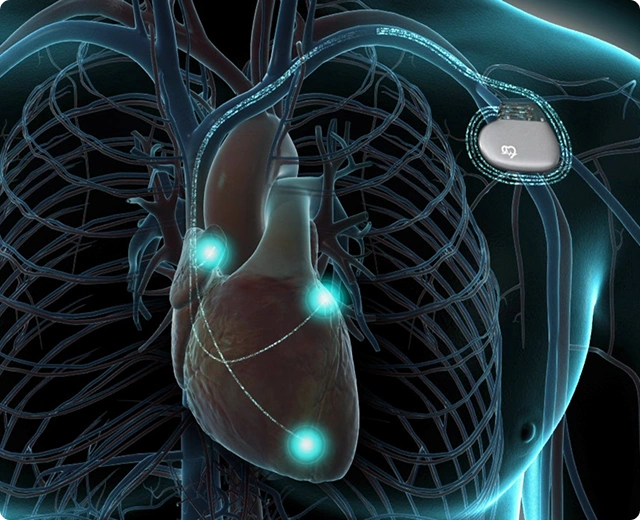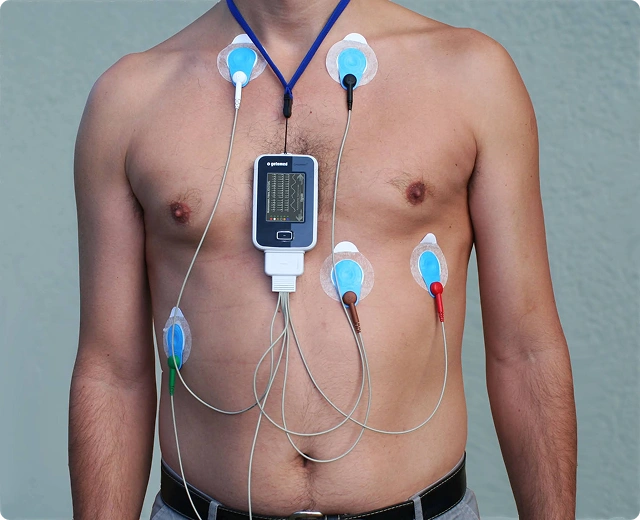Loop Recorder and Holter
Certain heart rhythm problems can be challenging to identify during a routine ECG. Devices such as the Loop Recorder and Holter monitor provide continuous or long-term monitoring of your heart’s electrical activity, which helps in detecting intermittent arrhythmias that may lead to symptoms like fainting, palpitations, or dizziness. These diagnostic tools are either non-invasive or minimally invasive and are crucial for evaluating unexplained symptoms, guiding treatment, and preventing serious cardiac events. With expert analysis from Dr. Merchant and tailored care plans, these tools offer valuable insights into your heart’s rhythm health.

What is a Loop recorder?
A loop recorder is an advanced, implantable cardiac monitoring device designed to effectively identify irregular heart rhythms over an extended period, lasting up to three years. Placed just beneath the skin near your chest, it provides continuous surveillance of your heart's electrical signals, promptly recording any abnormal patterns. This device is especially valuable for diagnosing unexplained faints, palpitations, or rare arrhythmias. Operating around the clock and offering remote monitoring, it ensures real-time alerts and comprehensive data collection. The insertion procedure is quick, safe, and typically performed under local anaesthesia, resulting in minimal recovery time. Embrace peace of mind with proactive heart health management!
What is a Holter?
A Holter monitor is an essential, portable device that continuously records your heart’s activity for 24 to 48 hours, providing invaluable insights into your cardiovascular health. This device is comfortably attached with adhesive electrodes placed on your chest, which connect to a compact recording unit you can carry effortlessly throughout your day. By capturing every heartbeat during your regular activities—day and night—the Holter monitor excels at detecting transient or intermittent arrhythmias that a standard ECG may miss. The process is completely painless and non-invasive, making it an ideal choice for assessing troubling symptoms like dizziness, fatigue, or palpitations. Once the monitoring period concludes, the collected data is thoroughly analysed, guiding you and your healthcare provider in making informed decisions regarding your cardiac evaluation or treatment.

When are these devices recommended?
Loop recorders and Holter monitors are essential tools when standard ECGS or short-term cardiac tests fall short of detecting irregular heart activity. These devices are invaluable for diagnosing unexplained syncope (fainting), palpitations, dizziness, and episodes of rapid or slow heartbeats. Holter monitors are ideal for patients experiencing frequent symptoms within a day or two. Conversely, for those with rare or unpredictable issues like occasional blackouts or suspected atrial fibrillation, a loop recorder provides the advantage of continuous monitoring for months or even years. Additionally, these devices play a crucial role in evaluating treatment responses, tracking medication efficacy, and assessing risks in patients with existing cardiac conditions.
How is a loop recorder implanted?
The loop recorder is inserted just under the skin in a quick outpatient procedure that usually takes less than 20 minutes.
01. Anesthesia
Local anaesthesia is administered at the site to ensure the procedure is painless and the patient remains comfortable throughout.
02. Incision
A small, approximately 1 cm incision is made on the left side of the chest, just beneath the collarbone.
03. Pocket Creation
A narrow subcutaneous pocket is gently created to house the loop recorder securely under the skin.
04. Device Placement
The loop recorder is then inserted into the pocket with precision, ensuring optimal positioning for accurate data collection.
05. Closure
The incision is closed using sutures or surgical glue, and a sterile dressing is applied to aid healing.
06. Activation
The device is activated and tested to confirm it’s properly recording signals before the patient is discharged.

Loop Recorder & Holter Monitoring
Decades of Expertise
Dr. Merchant brings decades of hands-on experience in advanced cardiac diagnostics, making him a trusted expert in Holter and loop recorder monitoring.
Personalised Care
Every patient receives an individualised diagnostic plan tailored to their specific symptoms, lifestyle, and heart health history.
Cutting-Edge Technology
We use the latest Holter monitors and implantable loop recorders to ensure accurate, real-time heart rhythm analysis for early detection and peace of mind.
Compassionate, Patient-Focused Approach
Dr. Merchant combines technical precision with a human touch, making sure you're comfortable, informed, and supported at every step.
Contact Form
frequently asked questions
-
No, a loop recorder and a Holter monitor are different. A Holter monitor records heart activity continuously for 24–48 hours, while a loop recorder monitors intermittently over months or years.
-
A loop recorder is recommended for patients with unexplained fainting, irregular heartbeats, or suspected arrhythmias not detected by short-term monitors like the Holter
-
A loop recorder can stay in the body for up to 3 years. It continuously monitors heart rhythms and helps diagnose irregularities that occur infrequently over long periods.
